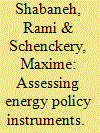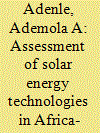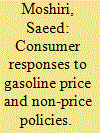|
|
|
Sort Order |
|
|
|
Items / Page
|
|
|
|
|
|
|
| Srl | Item |
| 1 |
ID:
171430


|
|
|
|
|
| Summary/Abstract |
The paper integrates the economics and geography theoretical methods, and takes the data of 119 Chinese A-share listed companies in the energy conservation and environmental protection industry from 2008 to 2017 as the research sample, analyzes the spatial heterogeneity of industrial capital allocation efficiency and its driving factors from the perspective of environmental regulation. The GWR model is constructed to study the effect of driving factors on the capital allocation efficiency of each province and visualize the spatial distribution state of driving factors. The results show that the capital allocation efficiency of China's energy conservation and environmental protection industry shows a trend of increasing volatility, but there are obvious spatial dynamic differences in different provinces. Environmental regulation has a significant positive impact on regional capital allocation efficiency and enhances the effect and spatial heterogeneity of other drivers. Infrastructure condition and financial development have a significant positive effect on regional capital allocation efficiency, and both tend to decline from east to west. While the government support has a low impact and the scope of fluctuation and spatial heterogeneity is small, indicating that the relevant government support policies still lack the pertinence and effectiveness of local conditions.
|
|
|
|
|
|
|
|
|
|
|
|
|
|
|
|
| 2 |
ID:
171390


|
|
|
|
|
| Summary/Abstract |
Addressing the threat of global climate change will require large-scale transformation of our energy systems. Scholars are increasingly calling for a more systemic approach to studying energy transitions—one that incorporates human dimensions such as behaviors, attitudes, perceptions, and preferences. Drawing on an exploratory representative study (n = 379 surveys) conducted in the Pogány-havas microregion of eastern Transylvania, Romania, we employ Stephenson et al.’s Energy Cultures Framework to describe and discuss the social and material energy system of the region. We highlight the interactions between norms, energy practices and material culture, as well as external influences that are shaping the energy system. We discuss attitudes towards energy conservation and acceptability of community renewable energy schemes. Based on our findings, we define the dominant energy culture of the region and highlight elements of the system that are either reinforcing the status quo or shaping a more sustainable energy culture. We discuss implications for increasing the efficiency of the energy system of this region and factors that could inform energy policies and sustainability interventions. We conclude by situating our research within a larger narrative of rural energy transitions and discuss the value of a systems approach when undertaking energy systems research.
|
|
|
|
|
|
|
|
|
|
|
|
|
|
|
|
| 3 |
ID:
171377


|
|
|
|
|
| Summary/Abstract |
Saudi Arabia relies heavily on oil-based generation to meet its power needs within a geographically unbalanced pattern of natural demand and supply. Many initiatives are currently being assessed to reduce the high opportunity cost of burning oil for the country. This paper examines the cost and implication of a disruptive policy where Saudi Arabia imports liquefied natural gas (LNG). To determine the possible and optimal sources to procure LNG into Saudi Arabia we use and configure a partial equilibrium model, specified as a linear programming problem. Two import scenarios were tested: the first assumes an import terminal with a capacity of 5 million tonnes per annum (MTPA) and the other scenario assumes 22 MTPA. Results show that Saudi Arabia can import LNG for power generation at a discount to the opportunity cost of oil. Especially during the summer months, as Saudi Arabia's gas demand is counter-seasonal to major importing regions it leads to even more interesting market pricing conditions. It also shows a small difference in landed cost of LNG between the two scenarios which implies the global LNG market can accommodate relatively large demand from Saudi Arabia without distorting significantly the global market pricing mechanism.
|
|
|
|
|
|
|
|
|
|
|
|
|
|
|
|
| 4 |
ID:
171364


|
|
|
|
|
| Summary/Abstract |
Realizing the full potential of a smart grid is contingent on the residential users’ acceptance of new technologies and the behavioural changes that will follow their implementation. Thus, the present research attempted to gain an insight into the factors that drive residential electricity consumers, particularly those with low income, towards or away from demand side management and distributed energy resources. The results of a consumer survey of 207 Japanese households revealed that there is a clear correlation between low-household income and the willingness of the respondents to reduce their energy expenditures. In contrast, the fear of the perceived additional cost required to implement these technologies, and the belief that consumers have inadequate information or support from the utility company, prevents them from adopting new technologies. Further, the results of a comparative analysis indicate that the reputation of the utility company is higher among smart grid users than traditional electricity consumers. The K-means clustering algorithm and hierarchical cluster analysis indicated that younger and poorer members of the society faced more barriers than middle age wealthier groups. The authors maintain that the electricity utilities thus need to develop a range of measures to engage residential consumers with heterogeneous socio-economic characteristics.
|
|
|
|
|
|
|
|
|
|
|
|
|
|
|
|
| 5 |
ID:
171374


|
|
|
|
|
| Summary/Abstract |
Regional electricity cooperation in South Asia, especially between Bhutan, Bangladesh, India and Nepal (BBIN), has been under debate recently. Recent discussions have gone beyond bilateral electricity trade to regional or tripartite trade. With limited energy resources and rapidly rising demand, cross-border electricity trade has been viewed as an alternative source of cleaner and lower price electricity supply in the long-term alongside domestic generation in Bangladesh. In this context, this study identifies barriers and opportunities for electricity trading for Bangladesh, focusing on the stakeholders’ perceptions. Theses stakeholder are representatives of public organizations in the power sector, Independent Power Producers, academia, geopolitical experts and research institutes. A well-structured SWOT analysis, in combination with Analytical Hierarchy Process (AHP), is used to identify the SWOT factors and subsequently rank them. Our analysis shows that the weaknesses and threats are more pronounced than strengths and opportunities for electricity trade from the viewpoint of Bangladesh. Several possible strategies are proposed to overcome the hindrances. Among the proposed strategies, a key strategy is the signing of a trilateral electricity trading agreement with joint development and implementation of cross-border power projects. However, to achieve these strategies, it will require meticulous planning, political will, and visionary leadership across BBIN sub-region.
|
|
|
|
|
|
|
|
|
|
|
|
|
|
|
|
| 6 |
ID:
171365


|
|
|
|
|
| Summary/Abstract |
Renewable energy sources like solar energy have an important role to play towards the implementation of the 2030 agenda and Sustainable Development Goals (SDGs) in Africa. While renewable energy was not stated as one of the technologies for the achievement of the Millennium Development Goals (MDGs), it played an indirect role towards meeting MDG targets especially in the areas such as household application, health, education and poverty reduction in Africa. However, renewable energy's impacts (including solar energy technologies) were not quantified, and lack of performance assessment could be in part attributed to the weak implementation of solar energy projects in the developing world including countries in Africa. The aim of this paper is to conduct meta-analysis of the literature on the performance of solar energy technologies in order to determine solar energy adoption trends in African countries. This is supplemented with expert interviews and data gathered from the World Bank/Global Environment Facility. Using three case studies of Ghana, Kenya and South Africa, this paper examines the benefits and challenges that are associated with the application of solar energy technologies for meeting SDGs in Africa. Finally, the paper concludes by highlighting the policy implication for the application of solar energy technologies.
|
|
|
|
|
|
|
|
|
|
|
|
|
|
|
|
| 7 |
ID:
171441


|
|
|
|
|
| Summary/Abstract |
We examine the asymmetric effects of oil supply shocks, shocks to global real economic activity, and oil-specific demand shocks on the oil, non-oil and overall trade balances of a large sample of oil exporters and oil importers. Our empirical strategy accounts for endogenous oil prices, heterogeneous parameters, and error cross section dependence within a panel framework. We find that the pattern of asymmetries in the oil price-trade balance relationship depends on the source of the shock. For both oil exporters and oil importers, oil supply expansions are more important than oil supply disruptions; we discuss the role that Saudi Arabia plays in limiting the global effects of oil supply disruptions. Although increases in global demand deteriorate trade balances for oil importers and improve them for oil exporters, decreases in global demand have a similar, rather than an opposite effect. Our results corroborate the existing evidence that oil price increases only generate large global imbalances if they result from demand-side shocks; and we present new evidence that oil price decreases only benefit oil importers if they result from supply-side shocks.
|
|
|
|
|
|
|
|
|
|
|
|
|
|
|
|
| 8 |
ID:
171392


|
|
|
|
|
| Summary/Abstract |
Increasing distributed renewable energy generation renders balancing of energy supply and demand more challenging. Peer-to-peer (P2P) exchange of decentrally generated energy is a promising means to optimize renewable energy flows. While previous research has primarily focused on the technological and economic benefits of P2P energy trading, little research has investigated customer preferences in this context so far. It is thus still unclear to what extent private actors such as homeowners are actually willing to participate in P2P energy communities and if so, under which conditions. Here, we address this research gap by analyzing homeowners' trading decisions in simulated P2P electricity trading scenarios. Findings based on a sample of 301 German homeowners show that community electricity prices and state of charge of private energy storages are key determinants of homeowners’ trading behavior. We moreover identified four target groups that systematically differed in their decision-making strategies ranging from price-focused prosumers (38.9%) to classic non-trading consumers (22.6%). Our findings provide promising insights for the design of P2P communities and allow policy makers to more accurately predict risks and benefits associated with P2P projects. Finally, our findings contribute to the development of tailored policy instruments aiming to increase P2P trading in decentralized energy communities.
|
|
|
|
|
|
|
|
|
|
|
|
|
|
|
|
| 9 |
ID:
171378


|
|
|
|
|
| Summary/Abstract |
Energy subsidies cost Ecuador 7% of its public budget, or two thirds of the fiscal deficit. Removing these subsidies would yield local economic and environmental benefits and help implement climate targets set in the Paris Agreement. However, adverse effects on vulnerable households can make subsidy reforms politically difficult. To inform policy design, we assess the distributional impacts of energy subsidy reform using Ecuadorian household data and an augmented input-output table. We find that subsidy removal without compensation would be regressive for diesel and LPG, progressive for gasoline, and approximately neutral for electricity. We then analyze how freed up public revenues could fund in-kind and in-cash compensation schemes to mitigate income losses for poor households. Our results indicate that removing all energy subsidies and increasing the cash transfer program, Bono de Desarrollo Humano (BDH), by nearly US$ 50 per month would increase the real income of the poorest quintile by 10% while leaving more than US$ 1.3 billion for the public budget. Finally, we conduct interviews with local policy makers and experts to identify two reform options that are progressive and considered feasible: eliminating subsidies on gasoline while increasing the BDH and replacing universal LPG subsidies with targeted LPG vouchers.
|
|
|
|
|
|
|
|
|
|
|
|
|
|
|
|
| 10 |
ID:
171376


|
|
|
|
|
| Summary/Abstract |
Policy makers across Europe have implemented renewable support policies with several policy objectives in mind. Among these are achieving ambitious renewable energy targets at the lowest cost, reducing CO2-emissions and promoting technology improvement through learning-by-doing. Using a detailed country-level model of generation markets, we address the question of how policies that subsidize renewable energy (feed-in premia and renewable portfolio standards (RPSs)) versus capacity (investment subsidies) impact the mix of renewable investments, electricity costs, renewable share, the amount of subsidies, and consumer prices in the EU electric power market in 2030 and how they interact with other policies such as the EU ETS. Our analysis shows that subsidies of energy output are cost-effective for achieving renewable energy targets in the short run, whereas policies tied to capacity installation yield more investment and might be more effective in reducing technology costs in the longer term. The difference in costs between these two policy options diminish with higher CO2-prices. Although the differences are significant, they are smaller than cost impacts of other renewable policy design features, namely the effect of not allowing EU members to meet their individual targets by trading renewable credits with other member states.
|
|
|
|
|
|
|
|
|
|
|
|
|
|
|
|
| 11 |
ID:
171444


|
|
|
|
|
| Summary/Abstract |
By focusing on the natural gas sector and infrastructural policy in the Visegrad countries this article aims to reassess the EU's role in energy security governance. It argues that the EU can be conceptualised as a catalytic state rather than a regulatory state. It develops the notion of Catalytic Power Europe to highlight the specific type of power that the EU (as a catalytic state) can deploy to achieve its objectives. Catalytic Power Europe differs from existing conceptions of Regulatory and Market Power Europe. It relies on nodality and treasury rather than authority and on mechanism of connectivity and mobilisation rather than enforcement. It highlights the role of the European Commission as a facilitator and coalition builder rather than a regulator and market builder as in the regulatory state perspective. This role is illustrated by analysing the major gas interconnector projects and liquefied natural gas importing terminal that are under development in the V4 and that can affect their energy security. Catalytic Power Europe influences the V4 inter-group dynamics reducing the scope for uncoordinated and unilateral strategies. In this way, it also affects the prospect of EU-Russia energy relations undermining Moscow's divide et impera strategies in the region.
|
|
|
|
|
|
|
|
|
|
|
|
|
|
|
|
| 12 |
ID:
171442


|
|
|
|
|
| Summary/Abstract |
Solar photovoltaic (PV) diesel hybrid systems are effective solutions for sustainable energy transition in countries where utility grids are intermittent. An ‘integrated appraisal’ of 'hybrid solar (PV) - diesel' systems are carried out to assess their overall energetic, environmental, financial and economic performances. The study carries out the analysis of hybridized solar photovoltaic energy using first-hand data and information collected from the Palestinian, Lebanese and Iraqi commercial and/or industrial sectors, adopting several scenarios of tariff and diesel fuel prices, capital costs assumptions, solar PV curtailment, and values for environmental damage adopted from life-cycle impact assessment methods that allow for monetization and are globally valid. Results show that hybrid PV-diesel systems have largely beneficial energy, environmental and economic performances in all three countries, whereas their financial performance are also positive for Palestine and Lebanon, however less promising in Iraq, mainly due Iraq's heavily subsidized electricity tariff. The study concludes with policy recommendations focused on promoting solar PV in the commercial and/or industrial sectors, namely: the gradual phasing-out of fossil fuel subsidies, the effective execution of net-metering, the provision of subsidized sustainable energy loans, and carefully designed energy management systems.
|
|
|
|
|
|
|
|
|
|
|
|
|
|
|
|
| 13 |
ID:
171416


|
|
|
|
|
| Summary/Abstract |
We revisit command-and-control regulations and compare their efficiency, particularly an emission cap regulation that restricts total emissions and an emission intensity regulation that restricts emissions per unit of output under emission equivalence. We find that in both the most stringent target case, in which the target emissions level is close to zero, and the weakest target case, in which the target emissions level is close to business as usual, the emission intensity regulation yields greater welfare than does the emission cap regulation. However, in the moderate target cases, an emission cap regulation may be better in terms of welfare than an emission cap regulation because the emission intensity regulation causes over-production. Our results suggest that the efficiency of a policy measure depends on the target level of emissions.
|
|
|
|
|
|
|
|
|
|
|
|
|
|
|
|
| 14 |
ID:
171424


|
|
|
|
|
| Summary/Abstract |
Improved energy efficiency can help reduce pollution, contribute to energy security, and help consumers save money. This paper explores energy labelling schemes as a policy instrument for promoting energy-efficient cars in Spain. Specifically, it explores consumer responses to changes in vehicle prices. We derive the demand responses for two different efficiency labelling schemes: absolute and relative. To that end, we calculate own- and cross-price elasticities of demand for cars with efficiency labels on the Spanish car market. The results show that the elasticities for more efficient cars are in general higher. However, in the specific case of sedans, the elasticities depend on assumptions about how consumers decide which car to purchase. If consumers are concerned about the absolute energy performance of cars independently of other attributes, and thus pay attention to absolute labelling, demand for more efficient cars is more elastic than demand for less efficient cars. If consumers choose the car segment first and then the energy performance, using the relative label, the opposite result is found. The results suggest that both relative and absolute labelling schemes can be useful, depending on how consumers make their decisions. It might also be possible to design a mixed system.
|
|
|
|
|
|
|
|
|
|
|
|
|
|
|
|
| 15 |
ID:
171369


|
|
|
|
|
| Summary/Abstract |
Gasoline consumption in emerging economies have been rising rapidly due to economic growth and increasing urbanization rate in recent years. However, the development has brought about new socio-economic and environmental challenges leading governments to adopt various policies to control the trend. Although the impacts of price changes on gasoline consumption are well-researched in the literature, studies on different policies in a specific country is limited. In this paper, we investigate the impact of three distinct policies (price reform, rationing, and fuel-efficiency) on consumer responses in Iran. We estimate price, income, and efficiency elasticities across household characteristics, income groups, and provinces using the AIDS model and the household expenditures data for the period 2005–2016. The results show that the average price elasticity is -76, however, it varies across household characteristics, time, and space. The price responses are greater in provinces neighbouring the countries with high price differentials and welfare losses of price reform are more sever for lower income families. The estimated elasticities under different policy regimes show that energy price reform has led to significantly higher elasticities, while rationing has led to decreased elasticities. The more stringent efficiency regulation and increasing imports of fuel-efficient cars have also increased elasticities.
|
|
|
|
|
|
|
|
|
|
|
|
|
|
|
|
| 16 |
ID:
171427


|
|
|
|
|
| Summary/Abstract |
Mitigation strategies towards progressive decarbonization of the energy system are a valid approach to slow environmental pollution yielding social benefits, as established from National Energy and Climate Plan (NECP). The first objective is the increase of energy efficiency within 2030 by promoting the use of renewable energy and the electrification of consumption in other sectors (household and transport). Cost-benefit analysis (CBA) is an analytical tool to evaluate investments and support policy decisions for society's welfare. The paper aims to assess how CBA can be used to quantify the costs and related social benefits in different sectors (energy, transport and household) if the decarbonization scenario is applied in Italy in 2030. Overall, our findings show positive benefits obtained with the adoption of different mitigation strategies for all sectors. These results can provide significant support to decision-makers in the implementation of decarbonization scenario in Italy scheduled for 2030.
|
|
|
|
|
|
|
|
|
|
|
|
|
|
|
|
| 17 |
ID:
171398


|
|
|
|
|
| Summary/Abstract |
This paper reviews and updates the current renewable energy (RE) policy landscape in Lebanon. The focus is on opportunities for decentralised RE to not only address Lebanon's insufficient energy supply but the compounding challenges of mass displacement and changing climate. In recent years Lebanon has made great progress in RE despite the ongoing regional turbulence but more could be done to utilise the countries abundance of renewable resources, growing population and entrepreneurial acumen. Energy policy from a prosperity perspective is informed by the role public services play in people's self-defined aspirations of what it means to live a good life. With the policy support from above, locally managed and decentralised RE supply has potential to not only address the energy crisis but also mitigate the impacts of mass migration and climate change, setting Lebanon on a path to a sustainable and prosperous future.
|
|
|
|
|
|
|
|
|
|
|
|
|
|
|
|
| 18 |
ID:
171381


|
|
|
|
|
| Summary/Abstract |
The radical changes that the electricity systems undergo due to environmental concerns and technological developments inevitably formulate new conditions for all actors in the electricity market: new market roles for existing actors as well as new actors with roles yet to be defined. The role of citizens as active market participants becomes central in the energy transition. This is empowered by the rapid increase in the penetration of Distributed Energy Resources (DER) comprising mainly distributed generators and flexible demand. The way DER will participate in the energy markets is of utmost importance, since this will critically affect the on-going decentralization of the energy system.
In this paper three fundamental models for DER integration in the market procedures are presented: direct DER participation, management through set-points or through price signals by a monopoly non-profit LEC or by a profit-maximizing monopoly aggregator, respectively. The models are formulated as optimization programming problems solved using commercially available software. Their evaluation is based on the study of several cost scenarios and their impact on significant indices that reveal the effect of the different market designs to the market participants.
|
|
|
|
|
|
|
|
|
|
|
|
|
|
|
|
| 19 |
ID:
171375


|
|
|
|
|
| Summary/Abstract |
While quantitative methods for tracking the evolution of energy efficiency (EE) in industry do exist, these cannot always be directly applied, mainly due to lack of data on physical activity levels, as encountered in Switzerland. Therefore, a bottom-up method is developed and tested for estimating the sectoral physical activity levels in Switzerland. On this basis, sector-specific EE indices are determined. The results show that during the period 2009–2016, EE improved most in the paper sector (3.3% p.a.), followed by minerals (2.3% p.a.) and food (1.6% p.a.) sectors while the levels have remained approximately unchanged in chemical and metal sectors. Furthermore, the annual change in final energy demand was decomposed into changes of physical production, price levels and EE. The analysis concluded that only the food sector performed well according to all performance indicators. The detailed analysis of the Swiss target agreements’ data has revealed major final energy savings in chemical and food sectors during the period 2000–2016. Among the different categories of EE measures, process related measures have proven to yield the highest energy savings across all sectors. The results indicate the successful implementation of EE measures in Swiss industry, favored by the relatively strict Swiss regulatory framework and its target agreement mechanism.
|
|
|
|
|
|
|
|
|
|
|
|
|
|
|
|
| 20 |
ID:
171434


|
|
|
|
|
| Summary/Abstract |
Technological progress is an effective way to improve electricity efficiency. Due to the existence of the rebound effect, it is of great significance to optimize the technical power saving policy by examining the rebound effect caused by different technological progress paths.Based on the panel data of electricity industry in 30 provinces of China from 1997 to 2013, this paper systematically examines the rebound effects of electricity consumption under the two sources of technological progress, namely independent innovation and technology import. Then, it discusses the impact of coal-electricity linkage policy. The empirical results are as follows: (1) without considering rebound effect, independent innovation significantly promotes electricity conservation, while the effects of technology import is not obvious; (2) when considering the rebound effect, electricity price declining driven by independent innovation is not conducive to electricity saving, while electricity price declining driven by technology import has an electricity-saving effect; (3)The coal-electricity linkage policy that began in 2004 not only reduced the rebound effect by increasing the flexibility of electricity prices to a certain extent and improved the electricity-saving effect of independent innovation, but also reduced the electricity-saving effect of technology import.
|
|
|
|
|
|
|
|
|
|
|
|
|
|
|
|
|
|
|
|
|